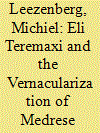| Srl | Item |
| 1 |
ID:
133820


|
|
|
|
|
| Publication |
2014.
|
| Summary/Abstract |
Eli Teremaxi's Serfa Kurmancî has not yet received the critical attention it deserves. It was dismissed by Auguste Jaba as a text of "minor interest," but in fact it is of paramount importance both for the study of the Kurdish language and for the history of Kurdish learning. Not only does it contain the oldest extant detailed remarks on Kurdish grammar, in all likelihood preceding even Garzoni's 1787 Grammatica; it is also among the first examples of Kurdish-language prose writing. The rise of prose texts of learning in Kurdish in the eighteenth century is an aspect of so-called "vernacularization," i.e. the use of a vernacular language for new purposes of written literature and learning. Vernacularization is, this article argues, a crucial prerequisite for the rise of a national language. The article also briefly discusses traces of a similar development in some of Teremaxî's near-contemporaries.
|
|
|
|
|
|
|
|
|
|
|
|
|
|
|
|
| 2 |
ID:
190222


|
|
|
|
|
| Summary/Abstract |
This paper explores the concepts and norms of gender and sexuality in Ehmedê Xanî's 17th-century mathnawi poem Mem û Zîn, nowadays regarded as the Kurdish national epic. A reading of this poem with the aid of the conceptual tools of gender studies and the history of sexuality reveals how different its norms and concepts are not only from modern Kurdish ones, but also from those of classical Persian literature. Although the poem does not hint at any taboo concerning male love for beardless boys, it does display a remarkable asymmetry between male and female same-sex desire; it also displays distinct views of legitimate and transgressive sexuality. Thus, this poem encourages a more historicizing view of the gendered and sexual dimensions of modern (Kurdish and other) nationalism, and a greater attention for the distinct characteristics of vernacular literatures within the premodern ‘Persianate cosmopolitan.’
|
|
|
|
|
|
|
|
|
|
|
|
|
|
|
|